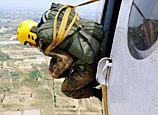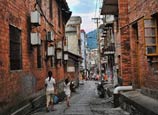
Hikers everywhere are asked to register with local forestry authorities, provide detailed itineraries and personal details as well as emergency contacts. Inspection of their equipment is often required. Sometimes guides are recommended.
"This is standard international practice," says Chen from the Xi'an rescue team.
Hikers should also leave detailed itineraries with their families, he emphasizes. "They are often the first to seek help," he says, but adds that families often have very little helpful information.
Rugged, uninhabited areas are risky, even for professionals. Last year, Chen and five volunteers set off to find a man lost in Shitouhe, Shaanxi Province.
"We climbed many cliffs that are 70 degrees, even more, or even vertical," he says. "The local guide was too afraid to help us. During the search some team members were too scared to look down. Remains of dead animals were everywhere," Chen recalls.
Finally, they found the hikers' clothes, shoes and backpack in the river.
"No one would end up in that place if they were not lost," Chen says. When travelers get lost, the worst thing they can do is blindly trying to find their way back, he says. "If they cannot find their way back, they should stay in place, waiting for a rescue team."
Being brave can be fatal.
In February three people froze to death on Ao Mountain. Despite a snowstorm the night before, they decided to keep climbing but because of the altitude and lack of oxygen, they lost consciousness.
Every year, the rescue team handles around 20 cases of adventure travelers in trouble in Shaanxi Province.
In 2010, 16 people died in the province. Last year, five people died because rescue came too late.
"Uninhabited places have majestic views and I am not saying that no one should travel there," Chen says. "As long as they are fully prepared and trained for survival and medical treatment, they can come back safe and sound.
"Going solo is a very bad idea," he is quick to add.
Riven Chen, a 27-year-old journalist, recalls he got hooked on adventure travel and backpacking when he was a university student. He has been backpacking for five years.
At first he wanted to broaden his horizon, but now he says he sometimes gets "perplexed" by the meaning of adventure travel.
"After experiencing such astonishing views, I would just feel empty when I come back. I am not in mood for anything. It's like holiday syndrome but takes much longer to recover," Chen says.


















 Migrant workes' high incomes not that rosy
Migrant workes' high incomes not that rosy


![]()
